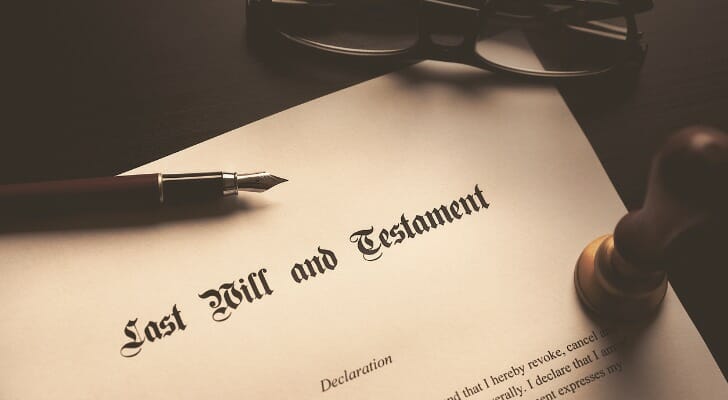Estate planning isn’t solely about protecting your financial assets. At its core, it’s about taking care of your family, friends and the causes that are important to you. Unfortunately, some key misconceptions are keeping people from making an estate plan, according to a new survey of 10,000 Americans. The No. 1 factor that holds people back from securing their financial legacies, and consequently puts their loved ones at risk? The idea that estate planning should be done “in the future” instead of now.
A financial advisor with estate planning expertise can help you draft a will, create a trust and establish parameters for your future medical care. Find a trusted fiduciary advisor today.
What is Estate Planning?

Estate planning is the process of dictating how your assets will be dispersed upon your incapacitation or death. Your estate included everything you own, including real estate, stocks, savings, cars, and even personal items like jewelry.
While the primary focus of estate planning is often placed on distributing your assets after your death, estate planning can also include assigning power of attorney or health care proxy to make decisions on your behalf if you’re unable to; identifying guardians for living dependents; gifting assets while you’re still alive to avoid estate taxes when you die; as well as appointing or beneficiaries on life insurance plans and retirement accounts.
For many people, a last will and testament is a sufficient estate planning instrument. This legal document spells out what you want to happen to your assets after you die.
However, for those with considerable assets or more complicated estates, a trust may be required. A trust is a legal entity that owns and manages a person’s assets. A trust, which can exist while a person is still alive or can go into effect immediately upon their death, can shield a person’s assets from creditors and help their beneficiaries avoid probate.
While there are many different types of trusts, they all must have a trustee and beneficiaries. While the latter is responsible for managing the trust, beneficiaries are the people or organizations that receive assets from the trust.
What’s Holding People Back?
The survey, which was commissioned by Wealth, a digital estate planning platform, found seven out of 10 people have a personal goal to pass on their wealth to family members when they die. However, it’s only about half of people (53%) who actually have an estate plan.
Some 40% of respondents who have yet to create an estate plan said they simply haven’t gotten around to it because it’s something to be done in the future, making it the top reason that people don’t have a plan in place. Meanwhile, 38% of respondents said they actively avoid thinking about death and another 37% said they have never even considered making an estate plan. For those who have a plan, 42% reported that they wish they had set one up sooner, the survey found.
Additional barriers exist for people of color and those who live in rural areas of the country. People of color are 21% less likely to say they’re knowledgeable about estate planning, while only 27% of rural respondents consider themselves knowledgeable on the topic.
The survey also identified a key hole that exists within the estate planning industry: employers typically don’t offer estate planning services, like they do with retirement savings accounts. In fact, only 13% currently get estate planning as an employee benefit. Meanwhile, seven out of 10 respondents who don’t already have an estate plan said they’d be more likely to create one if it were offered through their employer.
How to Create an Estate Plan: The Basics

The first thing you’ll need to do before creating an estate plan is take an inventory of your assets by making a list that includes the corresponding values for each asset. You’ll also need to ask yourself who you want to leave your assets to and how you want to divide them. After that, you’ll need to determine whether a will is enough or a trust is necessary. Even if you choose to establish a trust, you’ll still likely need to draft a will in conjunction with it.
When you’re ready to draw up the legal documents, you can work with an estate planning attorney or financial advisor, depending on your needs. Also keep in mind that online platforms make it easy to draft a will if you prefer to do it yourself.
In writing a will, you’ll need to name an executor, assign a legal guardian for any minor children and establish any necessary trusts. Then, you’ll need to review all your plans, accounts and shared assets to assign or update beneficiaries.
Next, assign a power of attorney and health care proxy who will make financial and medical decisions in the event that you become incapacitated. Next, write a letter that includes any information that hasn’t been accounted for in the will. This may include desired funeral arrangements or the bequest of sentimentally valuable assets. Lastly, make sure all documents are organized, properly notarized and stored someplace safe, like your attorney’s office or safety deposit box. This includes a list of your digital assets and passwords.
Bottom Line
A massive survey of 10,000 people with household incomes of at least $100,000 found that just over half of respondents have estate plans in place. The top reason people gave for not having an estate plans was the idea that it’s something to done in the future. Regardless of your age, not having an estate plan can put your family and financial assets at risk. Not having a clearly defined estate plan can make things extremely complicated and messy for family members or friends after you died. Estate planning can be as simple as drafting a basic will, but can also include creating trusts to secure larger and more complex estates.
Estate Planning Tips
- A financial advisor can help you create an estate plan to ensure that your assets are protected and distributed according to your wishes. Finding a qualified financial advisor doesn’t have to be hard. SmartAsset’s free tool matches you with up to three financial advisors who serve your area, and you can interview your advisor matches at no cost to decide which one is right for you. If you’re ready to find an advisor who can help you achieve your financial goals, get started now.
- Gifting assets to family, friends and organizations while you’re still alive can reduce the taxes that you estate may owe when you die. In 2022, the IRS permits individuals to give up to $16,000 per recipient per year tax free. The cumulative total of these gifts is then deducted from your lifetime gift tax exemption ($12.06 million in 2022). That means only the very wealthy will need to worry about their lifetime exemption limit. However, if the gifts given throughout your life exceed this exemption limit, your estate will pay taxes on the gifted assets that exceed the threshold.
Photo credit: ©iStock.com/FatCamera, ©iStock.com/simpson33, ©iStock.com/kate_sept2004
